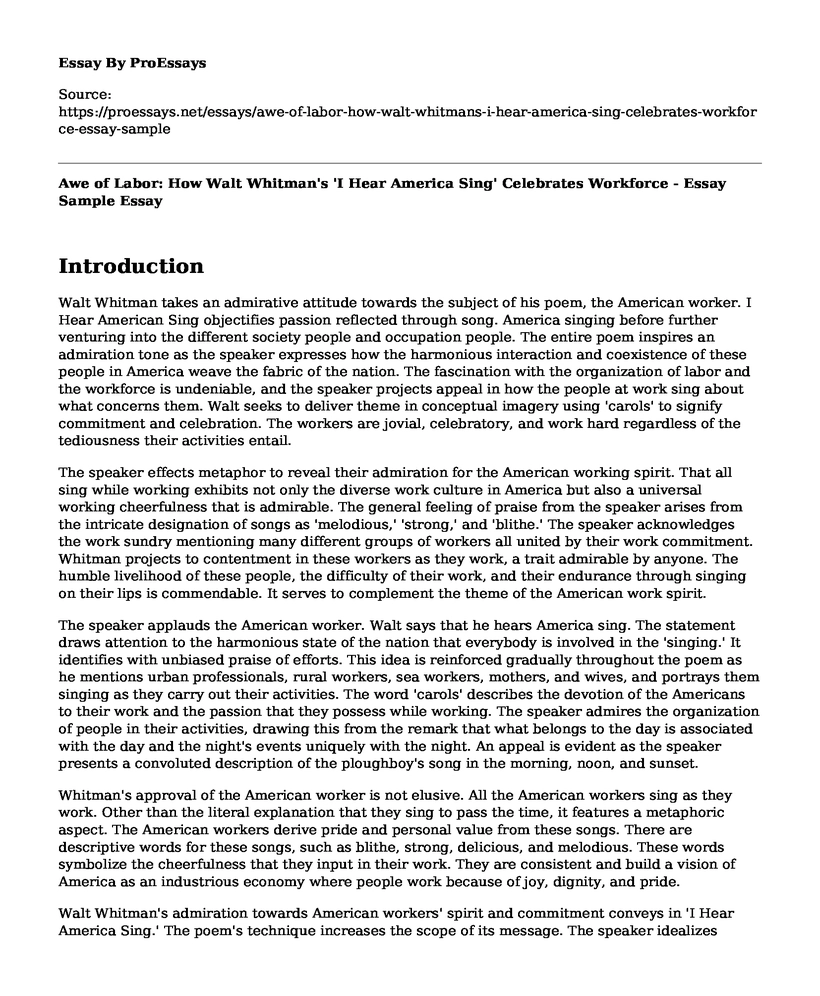Introduction
Walt Whitman takes an admirative attitude towards the subject of his poem, the American worker. I Hear American Sing objectifies passion reflected through song. America singing before further venturing into the different society people and occupation people. The entire poem inspires an admiration tone as the speaker expresses how the harmonious interaction and coexistence of these people in America weave the fabric of the nation. The fascination with the organization of labor and the workforce is undeniable, and the speaker projects appeal in how the people at work sing about what concerns them. Walt seeks to deliver theme in conceptual imagery using 'carols' to signify commitment and celebration. The workers are jovial, celebratory, and work hard regardless of the tediousness their activities entail.
The speaker effects metaphor to reveal their admiration for the American working spirit. That all sing while working exhibits not only the diverse work culture in America but also a universal working cheerfulness that is admirable. The general feeling of praise from the speaker arises from the intricate designation of songs as 'melodious,' 'strong,' and 'blithe.' The speaker acknowledges the work sundry mentioning many different groups of workers all united by their work commitment. Whitman projects to contentment in these workers as they work, a trait admirable by anyone. The humble livelihood of these people, the difficulty of their work, and their endurance through singing on their lips is commendable. It serves to complement the theme of the American work spirit.
The speaker applauds the American worker. Walt says that he hears America sing. The statement draws attention to the harmonious state of the nation that everybody is involved in the 'singing.' It identifies with unbiased praise of efforts. This idea is reinforced gradually throughout the poem as he mentions urban professionals, rural workers, sea workers, mothers, and wives, and portrays them singing as they carry out their activities. The word 'carols' describes the devotion of the Americans to their work and the passion that they possess while working. The speaker admires the organization of people in their activities, drawing this from the remark that what belongs to the day is associated with the day and the night's events uniquely with the night. An appeal is evident as the speaker presents a convoluted description of the ploughboy's song in the morning, noon, and sunset.
Whitman's approval of the American worker is not elusive. All the American workers sing as they work. Other than the literal explanation that they sing to pass the time, it features a metaphoric aspect. The American workers derive pride and personal value from these songs. There are descriptive words for these songs, such as blithe, strong, delicious, and melodious. These words symbolize the cheerfulness that they input in their work. They are consistent and build a vision of America as an industrious economy where people work because of joy, dignity, and pride.
Walt Whitman's admiration towards American workers' spirit and commitment conveys in 'I Hear America Sing.' The poem's technique increases the scope of its message. The speaker idealizes America from a technical perspective where individual commitment and cheerfulness at work contribute to the more massive American 'song.'
Cite this page
Awe of Labor: How Walt Whitman's 'I Hear America Sing' Celebrates Workforce - Essay Sample. (2023, Apr 25). Retrieved from https://proessays.net/essays/awe-of-labor-how-walt-whitmans-i-hear-america-sing-celebrates-workforce-essay-sample
If you are the original author of this essay and no longer wish to have it published on the ProEssays website, please click below to request its removal:
- Analysis of Beauty by Jane Martin
- The Fashion Police: Gender and the Rules of Beauty
- Business Consulting Industry Paper Example
- Criminology Strain Theory in 2pac's Lyrics Essay
- Discussion of a Concert Attendance and Critique of The Dinner Party by Neil Simons
- Movie Analysis Essay on The Life Equation
- Paper Example on Fantasy & Illusion: Tennessee Williams' 'The Streetcar Desire'







